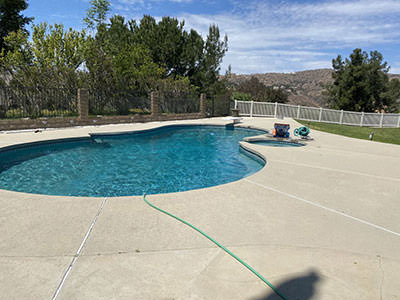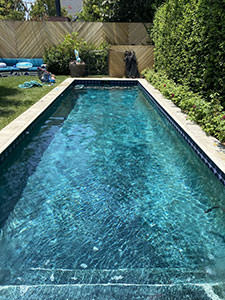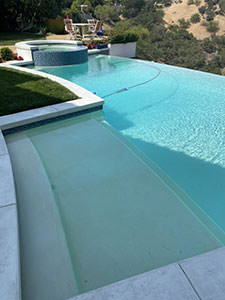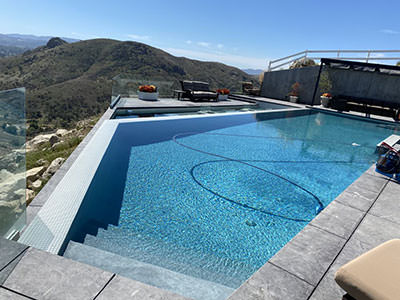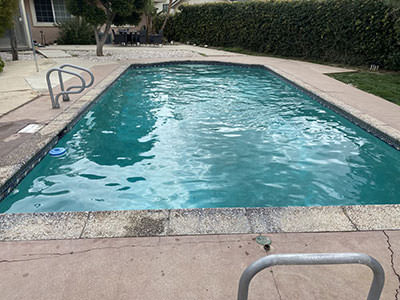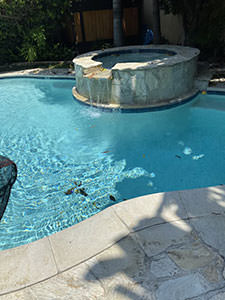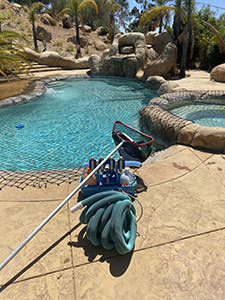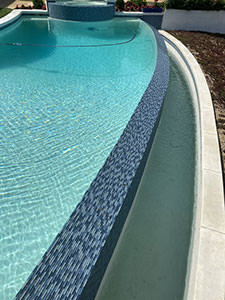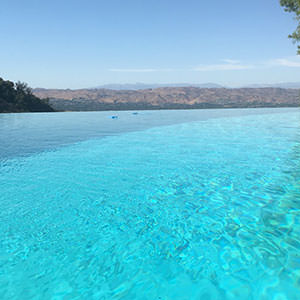Welcome!
PoolTech Nick is a Pool and Spa services company servicing Los Angeles county.
Currently servicing:
- Northridge
- Sherman Oaks
- Valley Village
- Encino
- Woodland Hills
- West Hills
- Beverly Hills
I offer swimming pool and spa services for removing any type of algae, filter cleaning, installing new swimming pool equipment, and swimming pool repairs. My services are performed by me, an expert technician who can repair and maintain any part of your pool with expertise. I will always keep you well informed throughout the process so that you can make proper decisions regarding your pool or spa.
I offer affordable swimming pool and spa maintenance, pool equipment repair, and weekly pool cleaning and can take care of all your swimming pool, spa, and fountain needs.
Before & After
Some of My Pools
Services
Weekly Pool Service
It's recommended that residential pools be serviced once a week & commercial pools be serviced a minimum of twice a week. However, depending on the number of people that use the pool, some commercial pools should be serviced every day.
Weekly service generally includes:
- Net Surface
- Vacuum
- Brush
- Clean Pump + Skimmer Baskets
- Maintain PSI
- Air Relief
- Check Valves
- Check PPM for
- Chlorine
- PH
- Alkalinity
- Calcium Hardness
- Add Necessary Chemicals to Maintain Sanitary Levels
- Add Salt When Necessary
- Clean Filter When Due
Does Not Include:
- Water Treatments
Chlorine is the most effective way to kill bacteria and algae. I use Muriatic acid to balance the pH and Alkalinity levels. Ideal pH for a pool is 7.4 - 7.6 because the proper pH makes the Chlorine much more effective. When needed Algaecide is used to kill algae or prevent algae from growing.
Residential Pool & Spa Cleaning Services
- Low Rates for Repairs and Services
- Reliable and affordable pool maintenance
- Prompt pool cleaning each week
- Make sure all equipment is functioning properly
- Algae Eradication Cleaning
- Fountains & Spas
- Scheduled weekly or monthly cleaning
- Salt water system maintenance
- Vacuuming pool floor and steps
- Brushing walls
- Pool tile cleaning
- Eliminating leaves and debris
- Cleaning out debris in Skimmer and Pump Basket
- Making your pool crystal clear with balanced chemicals
Pool Repairs
PoolTechNick sets itself apart from most pool service companies because I do all my own repairs in-house! Whether it comes to getting your heater to work, replacing valves, or helping you upgrade your system, I can do it all! You can trust PoolTechNick to give you the right advice, at the right price, before little repairs turn into big ones.
Currently offering service in the West Los Angeles, San Fernando Valley, and surrounding areas.
- Pool & Spa Repair Services
- Noisy pool motor repairs
- Valve Replacement
- Clean filters
- Pool pump repair
- Re-plumbing
- Pool spa automation
- Timers
- Salt Cell Chlorination
- Pool Resurfacing
- Acid wash
- Pool leak detection and repairs
- Pool heater repairs and installation
Basically, I do it ALL!
Frequently Asked Questions
Do you have to add chemicals like chlorine to my pool?
Chlorine is the most effective chemical to sanitize water. Your pool needs chemicals to kill inert bacteria and algae, and to have a balanced pH. With excessive heat and sunlight during the hot summer months, chlorine tends to evaporate out of the water, so we periodically add more to keep the concentration high enough to be effective.
Why is my pool green?
If your pool water is taking on a strange, green hue, it is possible that your pool has algae in it. This can be caused by improper chemistry, or by excessively hot days, when the sunlight eats the chlorine through evaporation, and the water is left unprotected, and algae begins to form. I can correct this with chemicals and a thorough cleaning with a specialized brush. A green pool can also be attributed to equipment failure that is causing the pump or motor to function at a lower performance level. Another explanation for a green pool is the need for filter cleaning. A dirty filter doesn't perform at full capacity.
How often do my filters need to be cleaned?
The answer can vary from filter to filter, not forgetting to take usage into consideration. Pools that get used a lot can require more frequent filter cleanings, but a general guideline on any residential swimming pool filter is to inspect the filter each month, and clean as needed. In general, most pools need their filters cleaned 2-3 times per year, more or less depending on the pool. Commercial pools tend to need filter cleaning more frequently.
Why is the water level in my pool so low?
Evaporation is the number one cause when it comes to falling water levels in a pool. On extremely hot days, it is vital to your pool to make sure the water level is always mid-way through the first perimeter tile. Adding water to your pool for an hour or so, once a week, will keep the water at the appropriate level. Your pool equipment only runs at full capacity with a pool full of water, otherwise you can put unnecessary strain on your pool equipment.
How long should my pool pump be running?
During the hot summer months, your pool pump should be running 6-8 hours a day while the sun is the hottest. Having your pump run only in the evenings will not provide the right amount of circulation for your pump to function at optimal levels. In the winter months, I will set your pump to run 4-6 hours a day.
Do you accept credit cards?
One of the things that set PoolTechNick apart from other pool maintenance companies, is the convenient feature of accepting credit card payments. Using a credit card with PoolTechNick is safe and secure, because we do not store any credit card information without your express direction and permission. Enrolling your account in auto-pay makes sure your pool never gets missed for non-payment. One-time payments are also welcome. Start paying for service with your credit card by calling me today!
Can you help me with energy-saving rebates?
In this ever-changing world, people are starting to truly care about our earth and the environment. PoolTechNick supports the efforts of environmental organizations, both local and global, by ensuring our customers are getting the most out of their equipment with regular service. Many cities offer rebate programs through DWP, Edison, SoCal Gas, and more! We keep up-to-date on all the current rebates for Los Angeles customers, so that we can provide expert advice when it comes to upgrading your equipment for ultimate energy-savings!
Pool Safety
It's no secret that a swimming pool can be a breeding ground for bacteria and algae. Outdoor above ground and in ground pools are exposed to the elements. Dirt, debris, animals and swimmers are all things that lead to contamination. It's more important than ever to properly maintain your swimming pool, not just for clear water, but for better health.
You've probably heard lots of stories about people getting sore eyes, rashes, even ear infections from swimming in domestic pools. Chlorine is often blamed for this. But the truth is that it's all got to do with good pool maintenance. If the water in your pool is properly sanitized, then you'll always have a healthy swimming pool. You just need to know what pool maintenance is all about, and then set up a good maintenance program for your pool.
Like everything in life, prevention is better than cure. So if you want to be sure you do have a healthy swimming pool, you need to maintain the water and keep it healthy. It's always a good idea to consider a weekly swimming maintenance package offered by technicians like me. I will take the responsibility, together with all the drudgery, of keeping your pool clean, and will ensure that you always have a healthy swimming pool.
Importance of a Balanced Pool
One of the most important steps of swimming pool maintenance is water balance. Generally, understanding water balance can also be one of the most confusing processes of pool maintenance. Because of its complexity, some new pool owners may not know everything they have to do to keep their pool water safe, comfortable and corrosion free. Below are a few of the reasons why having a balanced swimming pool is so important:
Safety
If you are using either a salt based pool producing chlorine or a chlorine based tablet pool, then your pH needs to be correct. If pool water is not balanced correctly, then the chlorine sanitizer won't be working at full strength killing germs and bacteria.
Comfort
Your water balance needs to be correct or it will affect your skin and eyes. The pH should be neither too acidic nor basic in order to feel comfortable.
Corrosion
An imbalanced pool can be corrosive to the liner, ladders and hand rail and other equipment such as the pump.
Outside Contaminants
The other key to pool cleanliness, then, lies in keeping outside contaminants from invading the water. Dirt, debris, cosmetic products, animal fur, insects, and other organic matter cannot be allowed to build up in any pool. In the event they are introduced, these things should be removed as soon and as thoroughly as possible.
Summer Ready Year Round
Swimming pool maintenance is a task that should be done all year long. This way you can spend less time worrying about the condition of your water and more time enjoying the pool. An even better benefit is by maintaining your pool all year long, you save money on big expenses by a consistent level of maintenance.
Total alkalinity is a significant factor in pool maintenance. It refers to how much alkaline is in the water. TA and pH go hand-in-hand. High alkaline water leads to high pH. Low alkaline water leads to low pH. The average swimming pool should have an alkalinity reading of 100 ppm. Keeping your pH levels within the proper range is important for keeping your equipment and pool finish intact. pH refers to the acidity or baseness of your pool water. A proper pH level is around 7.4 to 7.6 on a pH test kit's numeric scale. 0 to 7 reflects a low or acidic pH. 8 to 14 means the pool has a base pH level. Your chlorine will dissolve quicker with a low pH level. High pH levels make chlorine inactive.
Calcium Hardness is another important factor in pool maintenance. The right amount of calcium in your pool is essential. If there is too little, your plaster can erode. Too much calcium can make your water become cloudy, scale could form and stains might start. 200 to 400 ppm is the general range for calcium hardness, while 300 ppm is ideal for the average pool.
Stabilizer helps retain your chlorine longer just as insulation helps retain heat or air conditioning. Stabilizer can be added to some chlorine compounds to protect them from the breakdown effects of sunlight. When your stabilizer level is low, you'll use a lot more chlorine. When it's high, you may need to dilute your pool water to bring it back into the 40 to 100 ppm ideal range.
All water contains dissolved minerals. As pool water evaporates, minerals remain behind and become concentrated. The more concentrated these minerals become, the harder it is for chemical additives to work and stains can form. If you have 3000 ppm or more of total dissolved solids or TDS, you may need to drain some water and add fresh water. Ultimately, taking care of your pool doesn't end when you put the cover on. It's important to continue caring for your pool during the off-season (fall, winter, and early spring) to ensure a successful and clean opening.


